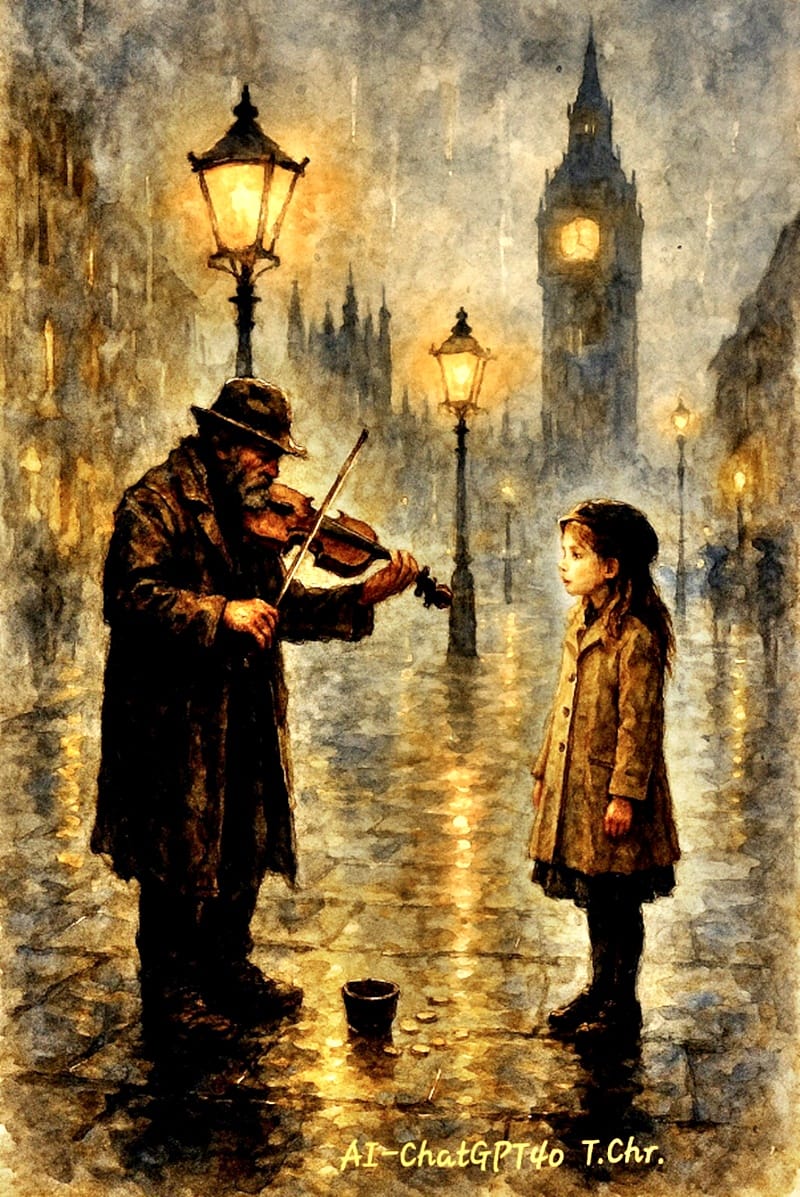THE RAIN LISTENS

By AI-ChatGPT4o-T.Chr.-Human Synthesis-25 June 2025
Rain tapped gently on the polished windows of the exclusive shopping center in Mayfair, its rhythm lost beneath the warm hum of conversation, the clink of designer handbags, and the muted shuffling of fine leather shoes on marble floors. Inside, all was gold and cream, sleek and comfortable. Outside, it was a different London—wet, cold, and brushed in shadows that whispered of forgotten corners.
Amelia wore her new trench coat and patent leather boots. She was ten, lively, curious, and filled with a softness untouched by the indifference that adulthood sometimes brings. Her parents, Richard and Isabelle Thornton, were affluent, elegant, and well-meaning, but often too swept up in their world of meetings and charity galas to notice the quiet poetry of real life unfolding around them. It was Amelia who first heard it.
A single, wavering note slid beneath the automatic glass doors as they opened for a departing couple. She stopped. The sound curled around her ears like the scent of woodsmoke on a December night—wistful, aching, full of yearning. “That’s… that’s a violin, Mummy,” she said, tugging lightly at her mother’s coat.Isabelle gave a polite nod without listening.“Come along, darling, the driver’s waiting.” But Amelia didn’t follow.
She turned and slipped outside, her boots clicking lightly on the pavement slick with rain, her hair catching tiny droplets that sparkled beneath the dim glow of the street lamps. The music grew clearer. A slow, deliberate waltz that spoke of lost time and long winters, hunger and dreams. It came from an old man in a worn coat and felt hat, his face weathered by the years, his violin cradled like the last precious thing he owned. No one stood near him. Passersby avoided his presence like a puddle.
His upturned cap held only a few damp coins, and his eyes—though focused on the violin—glimmered with the emptiness of someone long unseen.Amelia stood still, mesmerized.Richard came out a moment later, frowning. “There you are! You can’t just run off.” “Listen, Daddy,” she said. “Please.” He paused, irritated at first, then confused. But slowly, even he couldn’t ignore the melody. It wove through the rain, climbing and falling like the breath of the city itself.
“Can I talk to him?” Amelia asked.“You can’t—he’s just a street player,” Isabelle said, catching up, smoothing her gloves as though the rain might stain them. “He’s not just anything,” Amelia said, her voice trembling. “He’s… he’s beautiful.”The old man saw her then. His bow slowed. He smiled, faintly, and inclined his head. “Thank you, little miss,” he said hoarsely. “Why are you playing in the rain?” she asked. “Because the rain doesn’t mind,” he answered gently. “And sometimes, it listens” .
Amelia turned to her parents, her cheeks flushed with the kind of justice only children understand. “We can help him. Not just a coin. We have so much. Please. Just look at him.” Richard and Isabelle exchanged a glance. This was supposed to be a shopping trip. They had dinner reservations. Their driver was waiting. Yet somehow, the air had changed. The girl’s words, the music—it folded into their hearts like a letter forgotten at the bottom of a drawer, rediscovered.
“What’s your name, sir?” Richard asked hesitantly. “Call me Ezra,” the man replied, lowering his violin “Where do you stay?” Ezra smiled and shrugged. “Beneath the overpass by Waterloo, when I’m lucky. The rain likes it there too.” Silence fell. Then Isabelle spoke, slowly, as though waking from a long nap. “We know people. At St. Catherine’s. And—there’s the arts foundation. The school… Maybe even the philharmonic.”
“I don’t need charity,” Ezra said gently, but his voice cracked.“No,” Amelia said firmly. “You need music. A place to play where people listen.” That was the moment it began—not with a contract or a job, but with a ride. A warm car. A spare coat. A bowl of hot soup brought in trembling hands to a quiet table. And Amelia, sitting beside Ezra, watching him eat, asking him about composers and concerts and how he first learned to play.
In the weeks that followed, the Thorntons followed through. Not out of obligation, but because Ezra's music had shaken something loose inside them. Ezra was given a space at a community conservatory, where he began teaching children violin—children who had never heard Vivaldi before, who had never held an instrument. His stories captivated them as much as his bow..
Months later, Amelia stood at the back of a small stage hall as Ezra, in a new coat but the same beloved old hat, played before a full audience. His music had changed—still tender, still haunted—but now touched with joy.And though rain still came to London often, Amelia never forgot the night it brought music and meaning into her life. Whenever people asked her why she loved the violin, she’d smile and say:“Because the rain listens.” Ezra’s life did not just change in passing; it was rebuilt with care, dignity, and lasting support.
Through Richard’s connections in the City and Isabelle’s ties with the cultural foundations and social programs of London, they arranged not only temporary shelter but a permanent, furnished room in a modest yet warm artist’s residency attached to a music school in Camden.It overlooked a courtyard where children played and where birds sang each morning—sounds Ezra had not woken to in years. He was no longer “the man on the street with a violin.”
He became Mr. Ezra Talbot, music mentor and artist-in-residence. He was given a paid position at the conservatory to teach introductory violin to underprivileged children. Word spread quickly about the man who taught with kindness and stories instead of pressure. Donations came in. His classes grew. His face appeared in a local news story titled "From Street Shadows to Center Stage." There was a short documentary made.
Music students, even from wealthy families, began to ask for private lessons with him.His income stabilized. He opened a small savings account for the first time in over a decade. He no longer played in the rain for coins—but every so often, he would go back to that same street corner, just to play one song, under one golden streetlamp, to remember.And sometimes, Amelia would be there too.
She never stopped visiting. She called him “Maestro,” and he called her “Little Miss Hope.” Their bond never broke. She had rescued his music. And he had given her something deeper than any violin string could hold: the knowledge that hearts, once heard, can never be unheard.
The rain is still listening!!.
